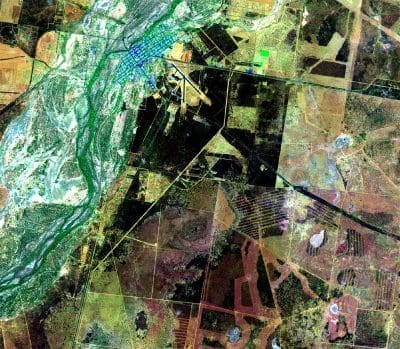
A true-colour Sentinel-2 satellite image of Charleville and surrounds in south-west Queensland. Image: Queensland Government.
As a cattle producer I have a few concerns about the Australian beef Sustainability Framework (ABSF) satellite mapping.
Previous and ongoing misuse of satellite mapping, selective use of statistics and a lack of ground truth context used against beef producers and indeed, all of agriculture, provides reason for concern about the latest ABSF announcement, as reported by Beef Central, February 23 in the article, “Australian Beef Sustainability Framework launches vegetation mapping tool”.
Firstly, I would like to know how much of our money, through RMAC and MLA, has been spent on it.
Secondly, I see that the management options of this mapping are being talked up. Those advantages are minimal and could be covered by the actions of producers on ground.
The groups who are most likely to use this mapping are green groups who have spent more than two decades defaming our industries by cherry picking data and writing reports which carry more weight than they deserve. To think that that will not happen with this data developed by our own industry bodies is naïve in the extreme.
In the words of Chair of ABSF Tess Herbert this data is able to be used in, “Analysing trends in woody vegetation and groundcover for every land parcel greater than 1ha and creation of a database and online tool that allows on-demand aggregation of data for states, NRM Regions, biographic regions, catchments, local government areas and other administrative and statistical areas.”
Data down to NRM Regions, local government areas and even smaller areas, even homogenised, is roaming into small sample size and will allow for regional discrimination.
The other group which will use this blunt instrument of satellite mapping against us for the purpose of enforcement of regulation, is government.
If government want tools for law enforcement, let them pay for their own. The Queensland government already has its own version of Aussie Farms online with more information to be added.
Queensland in particular, has a government which is overpowered with Green influence and some of the draconian legislation is in conflict with other laws and is impossible to comply with.
Weeds have more status and value under our green dominated departments than even temporary, bare ground.
With a fourteen-year WWF veteran as Chief of Staff for the Minister for the Environment and Great Barrier Reef, the overly harsh line taken against agriculture will continue. We do not need our own industry bodies enabling, affirming or validating their skewed version of science. The Queensland government, although probably not exclusively, has already done that. We need these bodies discredited, not pandered to.
The abomination that is popularly called Reef Regulations, for those who do not know it, is all based on modelling. Farmers of every ilk are being defamed based on a plethora of assumptions.
At the moment the government is rolling out the regulations with “authorised officers” telling landowners how to comply with the legislation. This will be followed by property audits and notices, hopefully with an opportunity to rectify problems. Eventually those “authorised officers” will be issuing penalties. The magnitude of those penalties and whether there will be an automatic right to a court hearing if you do not agree with the charges is, as yet, unknown. There is already a heavily used provision in the Queensland Vegetation Management Act which allows such a course of action with no automatic right to a court appearance.
Many of those who have been issued Restoration Notices under this provision have been livestock producers who have unwittingly gone outside the lines of their permits, for a multitude of defensible reasons, to use vegetation for stockfeed in the midst of what has been for some, at least an eight or nine year drought.
Northern cattle producers who have these sorts of dishonestly applied laws have been thrown under a bus.
For those who would like to reply that only landowners will be able to access their own specific data, think again. Queensland legislation, already empowers “authorised officers” to demand any records they please. Penalties for refusal are very high per document.
Unfortunately, this silo has been dominated by green ideology and the knock on affects Australia wide do not seem to have been considered.
I would like to remind the committee that sustainability needs to encompass economic and social sustainability as well as environmental sustainability and they all need to meld with one another. Green ideology does not allow for that.
- Joanne Rea is a Central Queensland cattle producer and the chair of landholder representative group Property Rights Australia
